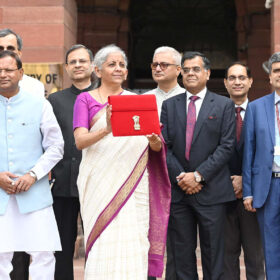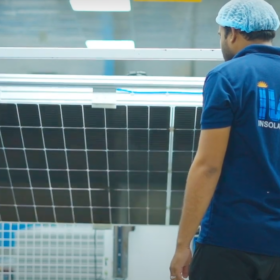A total of INR 24,376 crore (US$ 3,240 million) went to renewables projects in 2020, all of which were solar and wind. This is a 6% year-on-year increase from 2019. Solar PV accounted for 81% of renewable energy deals and 57% of all deals, finds the fourth edition of Coal vs Renewable Financial Analysis, authored by Climate Trends and Centre for Financial Accountability (CFA).
This analysis assessed 42 project finance loans across 38 coal and renewable energy projects in India that reached a financial close between January 1, 2020, and December 31, 2020. Renewable energy projects are defined as either hydroelectric, geothermal, wave, wind, or solar power projects. Total capacity across all coal and renewable projects identified was 7.5 GW.
The report said total lending to renewables and coal energy projects amounted to INR 32,897 crore (US$ 4,435 million). Renewable energy projects, with INR 24,376 crore (US$ 3,240 million), accounted for the majority share of 74%.
Solar remained the renewable energy of choice, accounting for 31 of the 37 RE deals. These financed a cumulative 5.18 GW of solar PV.
The States of Rajasthan and Gujarat attracted INR 18,671 crore (US$ 2,507 million), or 77% of all renewable energy loans. Meanwhile, Bihar, for the second consecutive time, received funding for a new coal project.
The report stated State Bank of India was the leading financier of renewable energy projects in 2020. Power Finance Corporation Ltd (PFC), and its subsidiary REC, were the sole state-owned financial institutions that provided project financing to coal power projects in 2020, finds the report.
Lending to coal remains depressed
The report stated 2020 marked a slight increase in coal funding after two years of consecutive decline. However, this is still over 85% lower than the INR 60,767 crore (US$ 9,350 million) in 2017.
“India’s funding trends are in line with what we are seeing globally. Finance for new coal projects has increasingly been withdrawn with international institutions moving away from funding coal fearing reputational, economic, and fiduciary risk. Federal Bank, India’s 7th largest commercial bank, announced a coal exit policy this year becoming India’s first bank to do so. PFC should follow in the footsteps of its private sector peers, move away from coal and towards renewable energy projects”, Joe Athialy, Executive Director, Centre for Financial Accountability.
Primary financing to renewable energy projects in 2020 saw an 11% year-on-year increase. SBI’s project finance loans to renewable energy projects in 2020 increased by a massive 334% compared to 2019. PFC provided INR 2,160 crore (US$ 289 million) in project finance loans to renewable energy projects in 2020, which is about 60% of project finance it provided to coal projects.
“Analysis shows that India needs an investment of around 38 lakh crores or US$ 500 billion in this decade to reach its 450 GW of renewable energy goal. For this to happen, not just international funds, domestic financial institutions must also chip in. PFC and REC seem to be funding more coal than renewable energy, which is not in line with the Central government’s stated objectives, including the commitments to phase down coal and turn to net-zero emissions in the long term. As renewables turn cheaper and easier to build, traditional institutions will realize that it is counterintuitive to keep funding more coal projects” Aarti Khosla, Director, Climate Trends.
“It is encouraging to see fewer financiers for coal every year. Given the pace of transition, it will be of utmost importance for policymakers and the government to ensure the millions of individuals who are dependent on coal for their livelihood are taken along and that the transition is just” Dr. Sudhir Chella Rajan, Professor, Indo German Centre for Sustainability, IIT-Madras.
This content is protected by copyright and may not be reused. If you want to cooperate with us and would like to reuse some of our content, please contact: editors@pv-magazine.com.









By submitting this form you agree to pv magazine using your data for the purposes of publishing your comment.
Your personal data will only be disclosed or otherwise transmitted to third parties for the purposes of spam filtering or if this is necessary for technical maintenance of the website. Any other transfer to third parties will not take place unless this is justified on the basis of applicable data protection regulations or if pv magazine is legally obliged to do so.
You may revoke this consent at any time with effect for the future, in which case your personal data will be deleted immediately. Otherwise, your data will be deleted if pv magazine has processed your request or the purpose of data storage is fulfilled.
Further information on data privacy can be found in our Data Protection Policy.